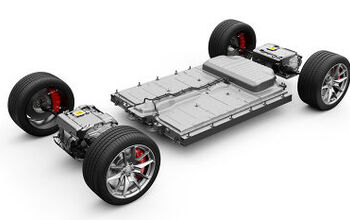France To Renault: We Own You (Even If We Don't Really Own You)

Money Control reports that the French government threatened to increase its stake in Renault from 15.01% to 20%. Not because it believes in the company and its products (would you trust a Renault Megane over a Honda Civic or Toyota Auris?), but to further exert control over Renault. Why would it want to do that? Well, that could probably have something to do with the French government’s invite to Carlos Ghosn for a little “sitdown” over the rumours that Renault may produce its new generation of Clio in Turkey, rather than its plant in Flins, France, where the current generation is built.
Christian Estrosi, France’s Interior Minister, told Reuters that there’s a 50-50 chance that the French state will raise its stake in Renault to as much as 20%. Like before, Monsieur Estrosi did not leave any ambivalence in his words. “We are considering this. What is certain is that we are looking for a way for them (Renault) to understand that the state with a stake of 15 percent is a state that has influence,” he said. France is Renault’s biggest shareholder, at 15.01%, just ahead of Nissan, who own 15%.
“We can do this by staying at 15%. Maybe going to 17, 18 or 20 is a psychological way to make them understand that we don’t intend to just let the industrial auto strategy of France run its course without reacting,” said Estrossi. To reinforce the point, he’s just announced that France will not actually increase its stake in Renault. Because it doesn’t need to.
“Whether we have 15 per cent of the capital, or whether we have 20 per cent, whether we have one director or whether we have six,” Estrosi told the Financial Times today, “do you think that is where things are decided or do you think it is in this place [the finance ministry] or at the Elysée?” No prizes for guessing the right answer.
In fairness, the French Interior Minister has showed he “reasonable” side, “What we are asking of Renault is not to close a production chain in Turkey, to ensure that the Clio 4 that is destined to be sold in France is produced in the country,” said Estrosi. He then added that it would be acceptable to make the vehicle in Turkey for that market.
Neelie Kroes, European Competition Comissioner, has sought explanations from the French government about its actions, in addition to the French pledge to grant public money to French car makers in return for keeping jobs domestically. “Our concern is about certain statements by the industry minister, Christian Estrosi, who that if a French car is sold in France, it should have been made in France,” said a spokesperson for Kroes.
Mind you, if you weren’t clear on Christian Estrosi’s position, he further clarified it by saying that the French government’s position towards Renault reflects a push by the authorities to strike (not that kind) a balance between interventionist policies and allowing companies to act freely. Oh, and he wants to protect French car parts suppliers by ensuring that French automakers source more parts domestically. Meanwhile, Bosch announced the closure of their starter motor factory in Wales, UK, which will include the loss of 900 jobs. Maybe we, the UK, could benefit from being a little more French….?

More by Cammy Corrigan
Latest Car Reviews
Read moreLatest Product Reviews
Read moreRecent Comments
- Honda1 Unions were needed back in the early days, not needed know. There are plenty of rules and regulations and government agencies that keep companies in line. It's just a money grad and nothing more. Fain is a punk!
- 1995 SC If the necessary number of employees vote to unionize then yes, they should be unionized. That's how it works.
- Sobhuza Trooper That Dave Thomas fella sounds like the kind of twit who is oh-so-quick to tell us how easy and fun the bus is for any and all of your personal transportation needs. The time to get to and from the bus stop is never a concern. The time waiting for the bus is never a concern. The time waiting for a connection (if there is one) is never a concern. The weather is never a concern. Whatever you might be carrying or intend to purchase is never a concern. Nope, Boo Cars! Yeah Buses! Buses rule!Needless to say, these twits don't actual take the damn bus.
- MaintenanceCosts Nobody here seems to acknowledge that there are multiple use cases for cars.Some people spend all their time driving all over the country and need every mile and minute of time savings. ICE cars are better for them right now.Some people only drive locally and fly when they travel. For them, there's probably a range number that works, and they don't really need more. For the uses for which we use our EV, that would be around 150 miles. The other thing about a low range requirement is it can make 120V charging viable. If you don't drive more than an average of about 40 miles/day, you can probably get enough electrons through a wall outlet. We spent over two years charging our Bolt only through 120V, while our house was getting rebuilt, and never had an issue.Those are extremes. There are all sorts of use cases in between, which probably represent the majority of drivers. For some users, what's needed is more range. But I think for most users, what's needed is better charging. Retrofit apartment garages like Tim's with 240V outlets at every spot. Install more L3 chargers in supermarket parking lots and alongside gas stations. Make chargers that work like Tesla Superchargers as ubiquitous as gas stations, and EV charging will not be an issue for most users.
- MaintenanceCosts I don't have an opinion on whether any one plant unionizing is the right answer, but the employees sure need to have the right to organize. Unions or the credible threat of unionization are the only thing, history has proven, that can keep employers honest. Without it, we've seen over and over, the employers have complete power over the workers and feel free to exploit the workers however they see fit. (And don't tell me "oh, the workers can just leave" - in an oligopolistic industry, working conditions quickly converge, and there's not another employer right around the corner.)































Comments
Join the conversation
There's no issue with getting quality from a factory in Turkey as opposed to anywhere else. Turkish workers are very proud of what they do and are really diligent in a way that would put many workforces in old europe to shame. But that isn't the point of this story. It's about whether or not the French Gov't will allow Renault to pursue what the management believe to be in the best long term strategic interest of the company - i.e. making a small car in a plant where workers command lower wages than they do in Flins (France). And this IS socialism and somehow, it seems pretty progressive to me. If you consider all the problems that the UK economy has from it's "laissez-faire" approach to industry and the fact that Sarkozy is determined that France will still have an auto industry in the future, I say fair play to them. Germany has shown that it is possible to build a lasting industry. And I'm pleased that the French aspire to something more than unemployment or working in telephone call centres.
Hmmm, excuse me Miss, but Mr Estrosi (aka the Motodidact (1)) is the Minister of Industry. The minister of Interior is Brice Hortefeux. And on the whole subject, it's only a smokescreen. His own government is the one that reduced the share the state had in Renault. But as regional elections are due in three months... (1) A pun on Motorcycle and Autodidact as he has been a professional racer and is renown for his lack of diplomas